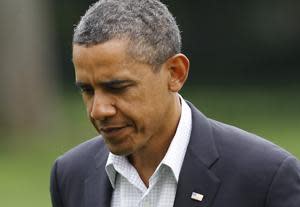 The Lookout
The LookoutPlenty of advice for Obama on jobs speech — will he take it?

On Thursday night in front of a joint session of Congress, President Obama will lay out his plans to fix the struggling economy and finally spur job creation. In advance, he's been getting plenty of advice, from across the political spectrum, about what the economy needs right now.
So who's been arguing for what--and perhaps more important, how does the barrage of advice jibe with what we can expect to hear from Obama Thursday?
There's little mystery about what many on the left want to hear from the president. In a letter to Obama released last week (pdf), the leaders of 70 liberal organizations called for a plan that's "big, bold, and create[s] jobs directly." They slammed "tax cuts and incentives for corporations" as "half-measures" that "have repeatedly failed to put Americans back to work."
How to pay for the effort? "Raise taxes on the wealthy, so that they pay their fair share again," the letter urged.
In an interview with Bloomberg TV last week, Richard Trumka of the AFL-CIO was more specific. "It has to be big enough to hit the problem," Trumka said, calling for direct infrastructure spending on road and rail projects. "If you're looking at $400 billion over a year for a number of years, that gets us in the ballpark."
Conservatives, by contrast, say Obama should focus on reducing uncertainty over taxes and regulation. "What [businesses] want is some certainty," Sen. Jim DeMint (R-S.C.) said Sunday on ABC's "This Week." "They want the regulators off their back."
And Doug Holtz-Eakin, a former director of the Congressional Budget Office and top economic adviser to Sen. John McCain's 2008 presidential campaign, appearing on the same news show, called for "a fundamental change toward a growth philosophy."
"We need to have some permanent changes, like a lower corporate rate, tax repatriations for our business community," Holtz-Eakin said. "And he actually does have to show some respect for the business community."
But thanks to some strategic hints from the White House, we already have a pretty good idea of some of the major ideas that Obama may well propose. Among them:
• A "national infrastructure bank," aimed at encouraging private-sector investment in the many road and rail projects that are in the national interest. Supporters, who come from both parties, have said the bank could help generate projects worth as much as $650 billion, but opponents say it would just add to the "bloated federal bureaucracy."
• A voluntary job-training program, based on one in Georgia, that allows the long-term unemployed to train with employers for a six- or eight-week period while continuing to receive jobless benefits. At the end of the training period, the employer can choose whether or not to hire the worker. But whether the program is likely to attract enough participants to have a significant impact remains very much up for debate.
• An extension of the temporary cut in the payroll tax paid by workers. The cut has been in effect since the start of the year, but will expire at the end of 2011 unless Congress acts. Republicans, who usually support tax cuts, argue this one hasn't done much to boost hiring--and they may be right.
• Extended unemployment benefits. These, too, have been in effect since the start of the year but will expire at the start of 2012 if not renewed. Jobless benefits offer a good bang for the buck in stimulating the economy, experts say, because the unemployed have little choice but to spend them quickly. But again, Republicans may be reluctant to sign off on more spending, and have argued that unemployment benefits increase joblessness by reducing the incentive to work.
• A program to fund the maintenance and repair of U.S. public schools. The idea, developed by the liberal Economic Policy Institute, would disburse around $50 billion to school districts for use on maintenance and repair projects that have been backlogged due to budget cuts. Supporters say this plan wouldn't require the government to borrow more money. Still, once again, Republicans in Congress are likely to be skeptical of a program based on direct federal spending.
• A renewed focus on signing new trade deals, designed to open up new markets for American products. The White House can likely expect some push-back on this proposal, depending on how it takes shape, from unions, which have fiercely opposed past trade accords.
In other words, the White House plan will have plenty that partisans on all sides probably won't like. Conservatives are likely to be disappointed that the focus won't be on lowering taxes and regulation--though in truth, they can't have expected that Obama would take their advice.
Meanwhile, liberals are likely to get more of what they want, but many probably won't be completely satisfied either: Extending the payroll tax cut, for instance, is exactly the kind of "half measure" that many say is insufficient.
But the key issue is one of scale. Most of the ideas the president looks set to propose are likely to spur growth--but they'd need to be super-sized to have a significant impact on today's job crisis. And whether Obama will push for a program that's commensurate with the size of the challenge--quite apart from the no-less decisive question of whether Congress will go along with it--remains to be seen.
